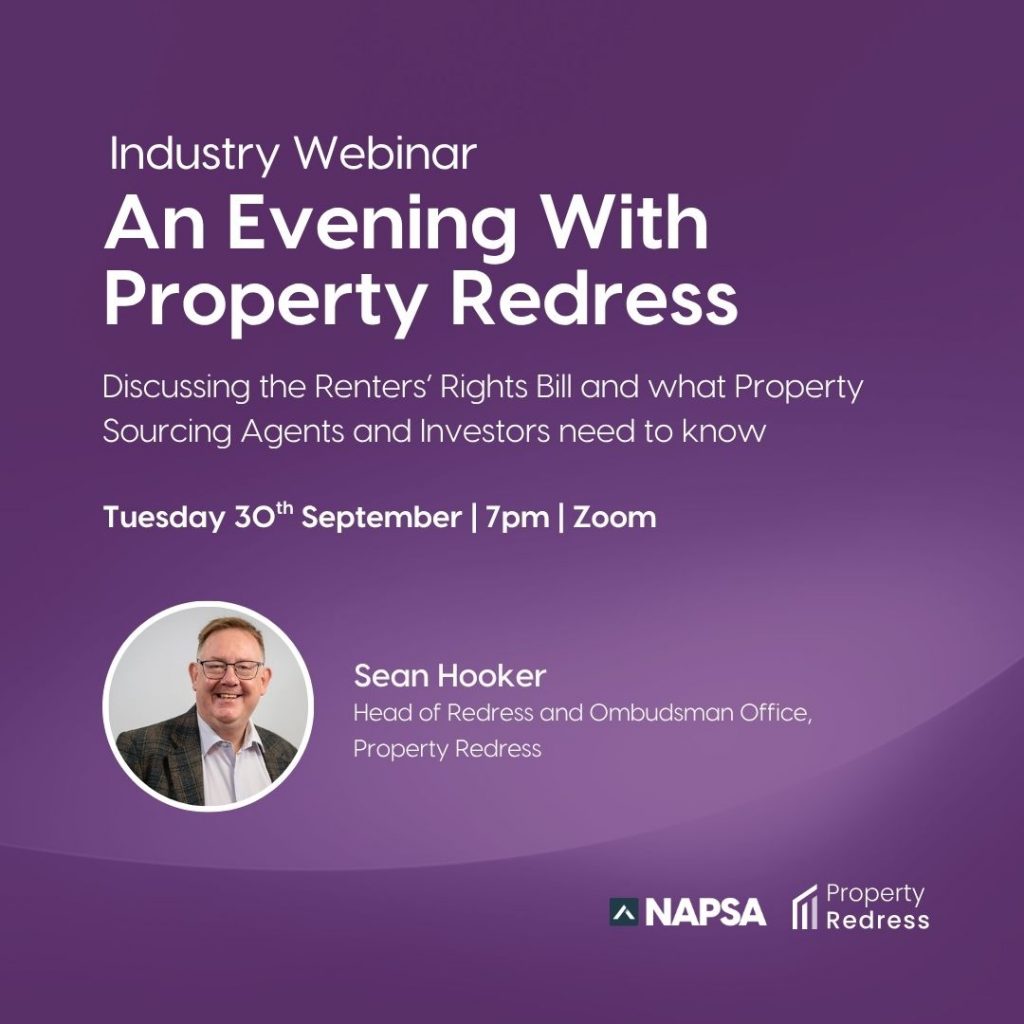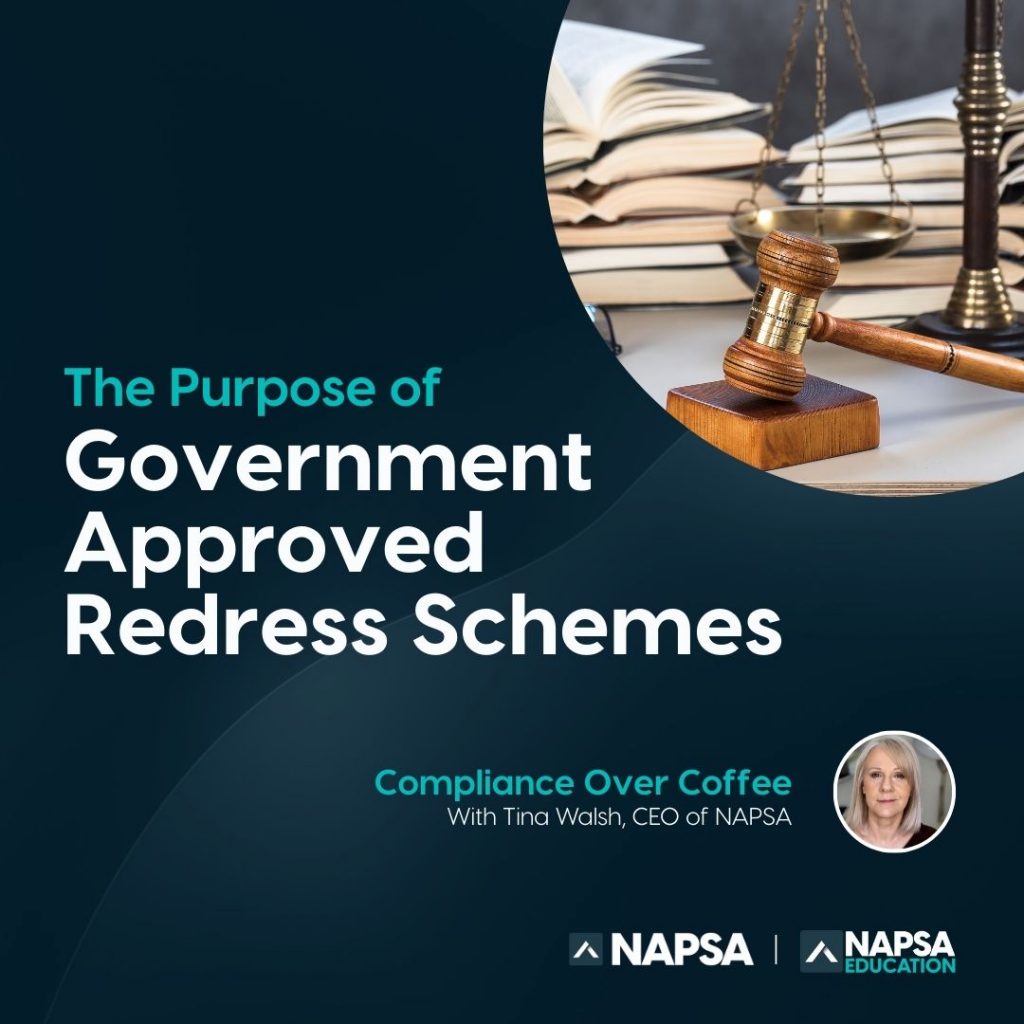The private rented sector in England is preparing for its most significant overhaul in over two decades with the introduction of the Renters’ Rights Bill. This landmark legislation will fundamentally change how landlords, investors, and tenants interact. During a recent NAPSA webinar, Sean Hooker, Head of Redress at Property Redress, offered a detailed breakdown of the bill and what it means for property professionals.
For property sourcers, deal packagers and investors, understanding these changes is not just beneficial, it’s essential for compliance and future success – we encourage you to watch the full recording to get a detailed picture of what changes are likely to come in and how these will impact the way you operate.
In addition to the recording, we have provided a summary of key takeaways from the presentation, focusing on the impact on investors and the critical material information sourcing agents must now consider.
Please note, this Bill has not get been given approval – these are opinions based on what the Bill looks like in it’s current format and changes may occur before it goes live.
Abolishing Fixed Term Tenancies & Section 21
One of the most profound changes is the complete removal of assured shorthold tenancies (ASTs) and Section 21 “no fault” evictions. This marks a major shift in how tenancies are managed and properties are possessed.
Rolling Periodic Tenancies
All new and existing tenancies will transition to a single system of rolling periodic tenancies. This means a tenancy no longer has a fixed end date and continues until either the tenant or the landlord gives notice. Whilst tenants can provide two months’ notice to leave at any point, landlords will face a much higher bar to regain their property.
The New Reality of Evictions
Landlords will no longer be able to use a Section 21 notice to evict a tenant without giving a reason. Instead, they must rely on the grounds outlined in Section 8 of the Housing Act 1988. This requires providing a specific, valid reason for wanting the property back.
Key points to remember:
- Court Hearings: All evictions, unless the tenant leaves voluntarily, will likely require a court hearing. The “accelerated possession” process will be removed.
- Mandatory and Discretionary Grounds: Some Section 8 grounds are mandatory, meaning a judge must grant possession if the criteria are met. Others are discretionary, leaving the final decision to the judge.
- Increased Notice Periods: Notice periods for landlords will generally increase. For instance, if a landlord wants to sell the property or move back in, they will have to provide four months’ notice instead of two.
Stricter Rules for Selling and Fixed Term
The bill introduces significant restrictions designed to prevent landlords from misusing eviction grounds. If a landlord evicts a tenant with the intention to sell or move in, a moratorium period applies.
After giving notice to sell, the landlord cannot re-let the property for 12 months, even if the sale falls through. This is a critical piece of material information for any investor considering a purchase, as it directly impacts their ability to generate rental income from the property.
Raising the Bar: Compliance and Property Standards
The Renters’ Rights Bill places a heavy emphasis on property quality and landlord accountability. For sourcing agents, this means due diligence is more important than ever. A property will absolutely need to be fit for purpose and meet the Decent Homes Standard (noted below), before any tenants can move in.
The Decent Homes Standard
A minimum property standard, based on the existing Decent Homes Standard in the social housing sector, will be introduced for all private rented properties. Sourcing agents must be able to identify if a property meets these standards before presenting it to an investor. If it doesn’t, the agent must clearly disclose the necessary works and associated costs.
Awaab’s Law and Damp & Mould
Following tragic events in the social housing sector, Awaab’s Law will be applied to the private sector. This places a direct legal responsibility on landlords to investigate and fix issues like damp and mould. The old excuse of “tenant lifestyle” will no longer be a valid defence; landlords must take positive action to mitigate the causes.
A New Landlord Ombudsman and Property Database
Whilst this won’t happen immediately under the bill, it will be a phased launch – the bill mandates that all landlords, not just agents, must join an ombudsman scheme. Additionally, a national property database will be created, requiring landlords to register themselves and their properties. Failure to register with either ombudsman or database will lead to severe penalties, including rent repayment orders of up to two years.
How Will This Impact Property Investors and Sourcers?
There are both threats and opportunities that Sean highlighted in the webinar that property sourcers must be aware of to remain up to date and inform their investors:
The Critical Role of Material Information
The concept of material information is central to a sourcer’s responsibility. You must provide investors with all the facts needed to make an informed decision. This now includes:
- Whether a property meets the Decent Homes Standard.
- The status of any existing tenancy and its compliance history.
- Any restrictions that could impact a Fixed Term-rent strategy.
- Potential costs for bringing a property up to the required legal standard.
Failing to disclose this information could lead to complaints and significant financial liability. Investors will be looking for sourcers who are not just Fixed Term but compliant, knowledgeable advisors.
Increased Risk for Fixed Term-Rent
The Fixed Term-rent model will become significantly riskier. The operator will be considered the landlord and must comply with all new legislation. If the property owner wants their property back at the end of a contract, but the sitting tenant doesn’t want to leave, the Fixed Term-rent operator will be unable to use “selling” or “moving in” as grounds for eviction – creating a potential contractual nightmare.
The Opportunity for Professionalism
Whilst some landlords may exit the market, this creates an opportunity for professional investors and sourcers who want to take advantage of the available properties. Those who are Fixed Term, compliant, and transparent will thrive. By educating your clients and providing a Fixed Term, reliable service, you can build trust and establish a strong reputation in this new landscape.
Your Action Plan: How to Prepare
- Educate Yourself: This is not a game for amateurs. You must invest time in learning the details of the bill. Attend webinars, read guidance, and stay informed as the legislation is finalised.
- Review Your Due Diligence: Your property assessment process must be updated to include checks against the Decent Homes Standard and other new compliance requirements.
- Be Transparent with Investors: Treat your investors as consumers. Provide clear, comprehensive information about every property, including its compliance status and any potential risks.
- Use Your Network: Lean on your professional associations, like NAPSA. They provide the resources, training, and support needed to navigate these changes effectively.
The Renters’ Rights Bill is set to create a more professional and regulated property sector. For sourcing agents who are prepared to adapt and prioritise compliance, this presents a significant opportunity to demonstrate their value and become indispensable partners to their investor clients.




